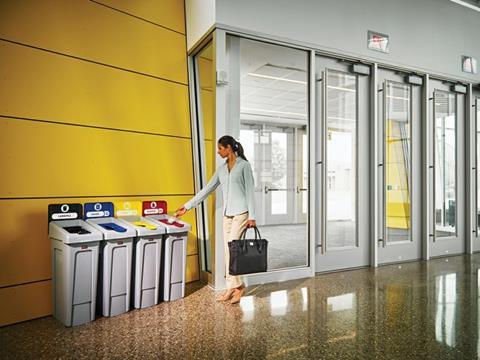
Rubbermaid Commercial Products (RCP) has published the findings from their second Love Recycling study. The initial study, performed at the start of 2020, gave renewed insight into an important area of commercial life. With the ongoing drive for sustainability in all facets of commercial activity, the continental and nationally focussed reports were welcomed with great interest by European businesses of all sizes.
Since then, the conditions under lockdown saw some sectors closed completely and others under increased operational pressure, creating greater volumes of waste, such as used PPE. The pandemic’s effect on commercial recycling and waste management is a less discussed, less measured, but important area of commercial disruption.
The 2nd phase of the study, undertaken between July and September, sought to find out how commercial waste and recycling practices were disrupted by pandemic conditions, what new priorities it created and what specific effect lockdown (and the period since) has had on day-to-day practices as well as longer-term intentions.
The report contains a variety of findings:• 56% of respondents said recycling practices had been impacted by the pandemic• 30% of businesses say that recycling has gained importance because of the pandemic• Almost three-quarters of businesses indicate that their current recycling efforts are not always successful• 86% of businesses say they will give recycling greater focus in the coming years• The number implementing dedicated PPE disposal may be as low as 20%
While businesses are continuing to adapt to new scenarios and practices during their reopening phase, the findings in this report help to contextualise what they have prioritised and what still needs to be done.
Paul Jakeway, Head of Marketing, Rubbermaid Commercial Products EMEA said, “Commercial recycling is a long-term project that changes and develops over time. When disruptive events like the pandemic occur, they have the potential to derail progress, or create setbacks.”
“The Love Recycling Research Project has seen us work with over 1,000 European business of all sizes. When we conducted our initial study, it was to see what the general state of commercial recycling was within Europe. From that basis, this second, more specific study, gave us a chance to see what had changed during and after lockdown.”
“The businesses we spoke to are, on the whole, still in a phase of adapting to changes that the pandemic has brought, but with 86% of businesses intending to increase focus in the coming years, we are optimistic that commercial recycling will continue to develop, despite the disruptions.”
During the remaining months of 2020, and into 2021, European businesses are expecting to reopen and return to pre-pandemic levels of operation. Businesses can use this opportunity to implement and improve recycling processes at their facilities, develop their sustainability credentials and do more to help minimise the commercial impact on the environment. The second Love Recycling study details the key areas of waste management that businesses should focus on and gives insight on how businesses can recycle successfully.










